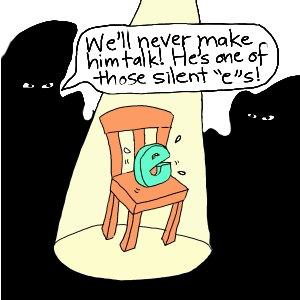Five Spelling Rules for “Silent Final E”
Page 1 of 1
 Five Spelling Rules for “Silent Final E”
Five Spelling Rules for “Silent Final E”
Many English words end in the letter 'e'.
In an earlier stage of the language, many of these final e’s were pronounced. Now, however, unless the word is a foreign borrowing, the final 'e' is silent.
Although final 'e' is silent, it usually has a job to do.
Here are the five rules for the use of silent final 'e'.
1. Silent final 'e' makes the vowel say its name.
Compare the pronunciation of the following pairs of words:
'con' - 'cone'
'cut' - 'cute'
'mat' - 'mate'
In cone, the e makes the o say “O”. In cute, the e makes the u say “U”. In mate, the e makes the a say “A.”
This first and most common kind of silent final 'e' “makes the letter say its name.”
2. English words don’t end in 'v' or 'u'.
The e at the end of have and blue do not affect pronunciation. The e is there because the words would otherwise end in v or u. 'Impromptu' is one of the few exceptions to this rule.
3. Silent 'E' after the letters 'C' and 'G' “soften” their sounds.
The letter 'C' can represent the sounds of either /k/ as in cat or /s/ as in cent.
The letter 'G' can represent the sounds of either /g/ as in gum or /j/ as in gym.
Silent final e after 'C' and 'G' indicates that the sounds are /s/ and /j/. Ex. "lance and charge." Without the silent final e, these words would represent the pronunciations /lank/ and /charg/.
4. Every syllable must have a vowel.
In words like candle, pickle, and people, the final syllable can be pronounced without a vowel, but “in English, every syllable must have a vowel.” (Would we really want to write pebbl or littl?)
5. Sometimes the silent final 'e' has no purpose whatever.
In words like 'are', and 'ore', the silent final e does not affect the pronunciation or provide a missing vowel, or keep a word from ending in 'v' or 'u'. This is the e that Mrs. Spalding (Romalda Spalding, The Writing Road to Reading) calls “no-job e.” Like 'Everest', it’s there.
The word resumé is often spelled in English with the French accent aigu to indicate the untypical pronunciation.
The final 'e' at the end of the Italian musical borrowing forte (loudly, powerfully) is pronounced like a long a: /for-tay/. Ex. "This measure is marked forte."
The final 'e' at the end of the French borrowing forte (strength, strong point) is silent, although many speakers pronounce this word the same way they do the musical term. Ex. "Cooking is not my forte."
Industrious critics will point out exceptions that I’ve failed to mention, but in most cases, the five rules apply and are useful to know.
http://www.dailywritingtips.com/five-spelling-rules-for-silent-final-e/

Vincent Law- Advanced Fluency

- Posts : 1537
Join date : 2011-12-22
Age : 50
Location : Philadelphia
 Similar topics
Similar topics» GRAMMAR - Silent Final "E"
» SPELLING RULES
» Rules and exceptions of English spelling
» SPELLING - Spelling the long vowel sound /ē/: ee, ea , e-e, y
» Silent Letters
» SPELLING RULES
» Rules and exceptions of English spelling
» SPELLING - Spelling the long vowel sound /ē/: ee, ea , e-e, y
» Silent Letters
Page 1 of 1
Permissions in this forum:
You cannot reply to topics in this forum

